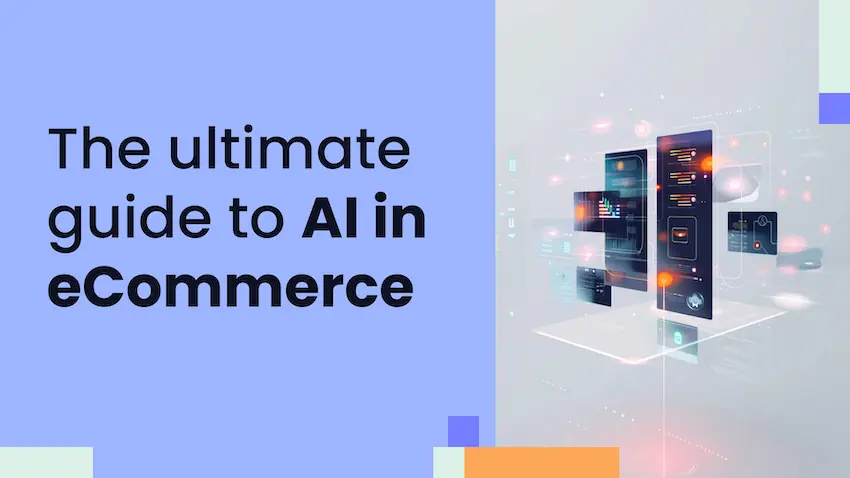The rise of tools like ChatGPT and Midjourney has highlighted the many ways AI can help eCommerce sellers upgrade their stores. Since then, many tools from image generation services to AI-powered virtual assistants have exploded across the market, making online shops more effective than ever before. To stay ahead of the competition and grow as a business, eCommerce sellers need to keep an eye on AI services that can give their businesses an edge. As the industry keeps developing and changing at incredible speed, doing so can prove to be hard. In this piece, we will break down AI’s impact on eCommerce and how sellers can leverage it for maximum benefit.
The impact of AI on eCommerce
Few industries have been rocked as heavily as eCommerce has by AI-powered services. According to Statista, the global AI market will grow to a total valuation of $126 billion in 2025. New AI services targeted at eCommerce sellers are popping up every day. Generative tools like ChatGPT and Midjourney have slashed costs for companies. Everything from product descriptions to video scripts for ads can now be initiated and polished instantly and at scale. Images for marketing content can be generated with speed and ease, and even product photos can be upgraded with AI tools.
99% of Fortune 500 companies are already using AI tools. Every eCommerce business can benefit from leveraging this new technology. Even more importantly, sellers should become familiar with the AI ecosystem, as new services that can disrupt the industry are likely to keep emerging. Being among the first to adopt a new strategy can mean a crucial edge over the competition.

However, as Neil Patel, a tech and marketing guru says, “Most AI tools aren’t worth your time.” Many companies are putting out services that probably won’t help your business. For this reason, it is important to have a good understanding of what is available and how to leverage it, in order to avoid wasting resources.
Leveling the playing field
AI has huge potential to lift up small to medium eCommerce businesses, removing advantages that only big companies could previously afford. Implementing an AI chatbot is easier than ever. Personalization, inventory management, and marketing can all be optimized with affordable services. Image-generation technology means that small sellers no longer need to hire a graphic designer or organize a costly product photoshoot. They can easily create and augment images with AI, which previously came at a great cost.
AI uses in eCommerce
Avishai Sam Bitton, 8fig’s VP of Marketing and Growth, sees many ways in which AI can lift up eCommerce stores. He feels that “everything around product description” is best for implementing AI. Text-generation services like ChatGPT stand out in this regard. He has found that “you can stack customer questions, have ChatGPT analyze them, and then write an FAQ” to provide more clarity.
Avishai has also seen that “using AI to create stage studio sets for product photos” is becoming very popular. That means taking a simple product photo and using image-generation services like AdCreative AI to create a beautiful and engaging background. This can allow for huge savings on photography and graphic design.
Subscribe to the eCommerce newsletter for
top industry insights
Here are some of the most prominent areas AI can upgrade eCommerce businesses:
Optimize product listings
There are many AI services that can help sellers craft more optimized product listings. Language generation models like ChatGPT and Gemini can quickly sort through large amounts of data, such as competitor product descriptions, and provide you with superior copy that targets the same keywords.
Customer service
AI chatbots can have a huge effect on customer conversion, while still being relatively affordable. Services like Rep AI automate your chatbot and streamline the shopping experience, quickly providing customers with product information to keep them engaged.
Keyword research
Semrush is a great AI tool that allows you to do profound keyword research quickly. You can get consistent access to fresh keyword data as it changes so your listings stay optimized. This kind of information can immensely boost marketing campaigns across multiple channels.
Product research
Jungle Scout’s AI-powered tools provide great options for product research. This can prove invaluable, for example by going over competitors’ product reviews at scale to identify customer pain points so you can address them with your product and marketing.
Image generation
Many eCommerce sellers are already using services like Midjourney and Adobe Firefly to create or improve product pictures or images for their marketing efforts. Intuitive and fast, learning to master these tools can help businesses quickly and cost-efficiently craft beautiful and compelling product photos.
The future of AI in eCommerce

Yoav Oz of Rep AI, an AI sales chatbot service for eCommerce sellers, is excited about where technology is taking eCommerce. However, he still believes that AI-led progress in eCommerce is still lagging behind its full potential. In his view, “eCommerce is like an IKEA catalog that hasn’t changed in the past 15 years. You have a search box and a menu that are usually very confusing. It was great for consumers 10-15 years ago, but consumers changed, technology changed, and D2C brands need to adapt.” That means getting better at recognizing what customers want and offering them great and intuitive brand experiences.
Rep AI presents a vision of how consumers will shop in the future. “It is going to be fully conversational, to the point, and will understand the issue that customers have in 5 seconds so that it can be resolved immediately,” says Yoav.
Its current AI chatbot service determines when a digital shopper is most likely to leave the site, and starts a conversation with them before they do. The goal is to quickly identify their pain points and keep them engaged. It works to help them find the product they need and even allows them to add to cart within the chat. Yoav believes that online shopping needs to be more like this, simpler, more direct, and intuitive.
How does AI improve customer satisfaction?
Yoav has found that personalization, such as knowing the customer’s name and details is less important than directly and quickly understanding their problem. Sellers should aim to give every visitor to their site a ‘white gloves’ approach, by having a conversation with them, answering their questions immediately, and making things easier for them. This will help keep shoppers on the site and convert them into customers.
However, this also needs to be done with personality, which can be trained in an AI system. A customer who entered the shop via an ad is interested but might get confused by the site’s layout. They might have questions they don’t want to look up in a FAQ section. A high-quality AI chatbot can quickly and directly answer questions, for example why the product is so expensive or what features it has. This can level up the customer experience and increases the likelihood of people coming back, even if they don’t buy anything during their first site visit.
How can a small business get started with AI?
For a brand with a tight budget, Yoav recommends deciding whether your priority is to reduce costs or increase sales. Then focus on that. If sellers want to reduce costs, and customer support is an issue, they should look for an AI service in this field that is within their budget. If the goal is to increase sales, sellers should explore the available tools, which may be more costly, and then measure their performance over 5-10 weeks. Leveraging free trials is a great strategy here. If you aren’t familiar with AI technologies, Yoav recommends learning by trying and keeping at it. In his words, “I always say, ‘try, try, try.’”
How AI is changing the industry

Amy Wees is the founder and CEO of Amazing At Home, an eCommerce consulting company that provides guidance on leveraging AI, as well as product development, sourcing, and marketing. She believes sellers can convert more customers by using AI “to analyze, review, and summarize listing copy and images, as well as reviews and customer feedback.”
Once it has gathered this key data, AI can conduct a thorough competitive analysis and tell you exactly what improvements to make. This can mean everything from upgrading products to tweaking product copy and images. Amy adds that “AI can also be used to quickly review your PPC data and make recommendations on how to improve.” The possibilities are endless.
How AI influences ranking
AI is now being used across eCommerce platforms to review and interpret product listings and customer feedback data. Its analysis is impacting the search results shown to customers. “This means that keywords will be less important in ranking our products and a more comprehensive contextual view of our product listings will be used to determine our rankings,” believes Amy. Google is changing the way its search engine works and shows results, which will impact rankings for brand websites. Meanwhile, Amazon is following suit by changing listing titles, bullet points, and even categories based on the AI-interpreted data.
Amy foresees that “we will see the rise and fall of a lot of businesses in the next year, and AI will be at the center of it all.” As AI’s influence on eCommerce becomes bigger and bigger, she finds that sellers need to become more familiar with this technology “so they can leverage it in all areas of their business.”
Top AI tools
Popular content
- 14 strategies to improve your eCommerce business’s financial health
- 50+ ChatGPT prompts to elevate your eCommerce business
- A guide to pricing your product on Amazon
- 5 marketing metrics all eCommerce businesses should track
- All about Amazon PPC
Amy believes that sellers should stick to the tools made by the key players in the AI space, such as OpenAI (ChatGPT and DALL-E), Adobe (Firefly), Google (Gemini and Labs), and Anthropic (Claude.ai). Her reasoning is that “most of the new tools that are released are simply calling the API (Application Program Interface) of OpenAI, so when OpenAI releases an update, it often makes these other tools obsolete.” Sellers should not that is better not to make long-term financial commitments to any one service or product, as the industry is changing all the time. Here is a breakdown of the best services available right now:
ChatGPT
ChatGPT is one of the best text-generation tools out there. ECommerce sellers can use it for product descriptions, social media posts, data analysis, demand forecasting, and much more. It is also ideal for starting out with AI since its basic version is free. ChatGPT has the ability to craft high-quality, keyword-optimized product descriptions, as well as sort through huge amounts of data to tell you what keywords to target. The more information you give it, the better it performs.
Gemini
Gemini, Google’s text generation service, can analyze user behavior and market trends, providing actionable insights that sellers can use to optimize their product listings, pricing strategies, and marketing campaigns. By utilizing Gemini, eCommerce businesses can improve their search engine visibility, personalize customer experiences, and make data-driven decisions to increase sales and customer engagement. Gemini has a reliable free tier that sellers can try before moving to a paid option.
Midjourney
Midjourney’s text-to-image generation tool allows sellers to quickly create high-quality, customized visuals for their products and marketing materials. This tool can significantly streamline the content creation process, saving time and resources while enabling sellers to produce compelling, eye-catching images that attract and engage customers, ultimately enhancing the customer shopping experience and boosting sales. Midjourney’s basic plan starts at $10 a month.
Jasper
Jasper.ai is a powerful AI tool that makes writing for your store easy. It helps with everything from ad copy and product descriptions to social media posts. As your business grows and you add more products, you’ll face the challenge of creating unique descriptions for each one, suitable for different places like Amazon, Walmart, or your own website. Jasper.ai simplifies this process, allowing you to efficiently scale content without sacrificing quality, even without a dedicated copywriter. It’s perfect for small to medium eCommerce sellers, starting at $49 a month with a free 7-day trial.
Adobe Firefly
Similar to Midjourney, Adobe Firefly is an AI-powered graphic design tool that enables the seamless creation of professional-quality visuals. It simplifies the process of designing product images, banners, and marketing materials, even for users with limited graphic design skills. With its intuitive interface and AI-driven suggestions, Firefly can automatically generate or enhance images, ensuring they are visually appealing and aligned with the brand’s aesthetic. A free version is available, which is ideal for sellers to try out.
Claude.ai
Claude.ai is an AI-powered language model developed by Anthropic. Similar to ChatGPT it can assist eCommerce sellers in creating engaging content and enhancing customer communication. It can be used to generate product descriptions, blog posts, and customer support messages, helping sellers maintain a consistent and compelling brand voice. Claude.ai’s services work with a token system, the cheapest of which can be purchased for $0.25, making it extremely affordable to try out.
8fig
Sellers who want to optimize their cash flow management can use 8fig to do so. 8fig offers its AI CFO (Chief Financial Officer) suite, which lifts up businesses to optimize their cash flow management. It does so by analyzing past store data in order to forecast how future cash movements. Its sales forecasting tool allows business owners to predict how their store’s performance is likely to look in the future. This means an improved ability to plan inventory orders and operations ahead of time.
8fig’s service also facilitates overseeing one’s supply chain, gaining a better understanding of how cash movements affect the business. This allows for a better decision on how to invest revenue and build sustained growth. You get free access to 8fig’s AI CFO upon signup.
Conclusion
Here is an example of the potential generative AI has. This video was created entirely with AI.
AI is here to stay. ECommerce business owners can join in on this development or get left behind. In little over a year, since ChatGPT entered the market, huge waves have already been made. This change is only set to accelerate, which means that new ways to upgrade stores are going to emerge continuously. One can speculate, but it is hard to foresee where exactly things will go. Because of this, those who familiarize themselves with AI today will have an easier time leveraging new innovations tomorrow.
Even non-tech-savvy sellers can learn by trying tools like ChatGPT or Midjourney and becoming familiar with them. Learning how to write good prompts that AI services respond to is becoming an increasingly crucial talent. Sellers that take these steps are sure to gain crucial know-how for sorting essential tools from all the inefficient services that litter the space. Going forward, AI and eCommerce are irrevocably linked.
Subscribe to the eCommerce newsletter for
top industry insights
to our blog
Read the latest
from 8fig

Learn how to fine-tune your supply chain for the holiday season with expert tips on forecasting demand, managing suppliers, and optimizing logistics. This guide is here to help you avoid common pitfalls and set your eCommerce business up for success during peak periods and beyond.

Video ads can make or break your eCommerce success. Learn five essential strategies to create high-converting campaigns that captivate and convert.

Personalization isn’t just a trend – it’s the key to eCommerce success. Discover how tailored strategies drive conversions, foster loyalty, and set your store apart.
